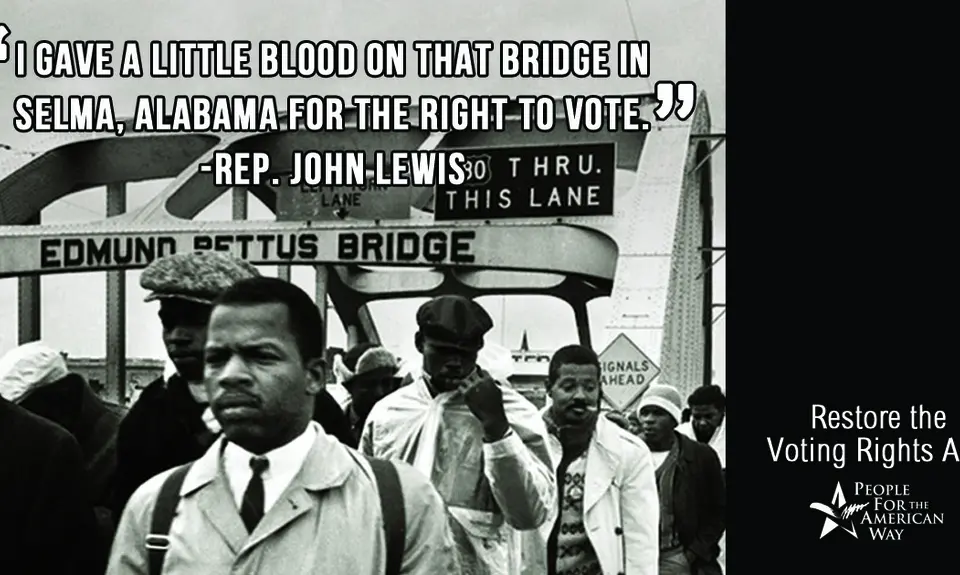Bloody Sunday was a turning point in the fight for the right to vote.
Fifty-four years ago this week, on March 7, 1965, 600 foot soldiers of the civil rights movement set out on a march from Selma to Montgomery in Alabama to honor Jimmie Lee Jackson and to continue a long-fought battle for voting rights. They were met by an armed posse as they crossed Selma’s Edmund Pettus Bridge. The attack, organized by Dallas County Sheriff Jim Clark, left 58 injured, including then 25-year-old John Lewis. After two more attempts, the marchers finally made it to Montgomery on March 25.
Fifty-four years to the day later, Senate Majority Leader Mitch McConnell, R-Ky., has scheduled a vote, likely to take place on March 7, on Eric Murphy, who has been nominated by President Trump to a seat on the U.S. Court of Appeals for the Sixth Circuit over the objection of home state senator Sherrod Brown, D-Ohio.
People For the American Way opposes the Murphy nomination, in part because of his demonstrated hostility to voting rights. PFAW's Right Wing Watch covered in detail his involvement in the Ohio voter purge litigation and a decision by the Department of Justice to switch sides in the case following Trump's election:
Husted v. A. Philip Randolph Institute was a challenge by Ohio voters and civil rights groups to an Ohio practice that triggered a process to remove voters from the rolls simply because they had not voted in a two-year period. In September 2016, the Sixth Circuit Court of Appeals ruled that the practice was illegal, as the Obama Justice Department also had maintained. In early February 2017, Ohio State Solicitor Eric Murphy filed a petition seeking Supreme Court review of the case. Two weeks later, Murphy contacted Trump political appointee John Gore, whom Trump had named deputy assistant attorney general in DOJ’s Civil Rights Division in January, about the case.
Before his Justice Department appointment, Gore had been at the Jones Day law firm, where commentators noted that he had “spent his career undermining civil rights,” including in voting cases. White House Counsel Don McGahn had also worked at Jones Day, and its alumni filled many other political positions in the early Trump administration. Like Gore, Murphy had previously worked for Jones Day on appellate matters, and the two had overlapped at the firm for several years.
According to the documents that DOJ released to Right Wing Watch, on February 17, Murphy sent Gore a copy of Ohio’s petition to the Supreme Court, claimed that DOJ’s position opposing the voter purge in the Sixth Circuit was not “consistent” with its previous positions on similar matters, and asked to speak with Gore about the case, clearly seeking to get DOJ to reverse its position in the case. Gore thanked Murphy for the email and asked for more briefs and other information, which Murphy sent. Gore also stated that he “ran into” someone that the two of them apparently both knew and that “he mentioned this case.” In the documents provided to RWW, DOJ concealed the name of that individual.
In June, after the Supreme Court had decided to review the case, Murphy emailed Gore asking if he had “time for a quick call on this matter.” DOJ has not yet produced any response to this email or any records relating to the content of any calls or meetings with Ohio attorneys or other outside officials concerning the case. At the end of July, Murphy emailed Gore a copy of Ohio’s opening brief to the Supreme Court arguing that the Sixth Circuit decision should be reversed. Around the same time, Gore was named the acting head of the Civil Rights Division.
A week after Murphy’s email, Gore responded, enclosing a DOJ friend of the court brief just filed in the Husted matter “in case you haven’t seen it.” In the brief, DOJ switched sides, now arguing that the Ohio purging plan was legal and that its view was consistent with an earlier DOJ position, exactly as Murphy had claimed in February. Voting rights advocates and others harshly criticized the switch, noting that, contrary to what Murphy had claimed, DOJ had previously taken the same position as it had in the Sixth Circuit. Gore, a political appointee, was the only attorney from the Civil Rights Division to sign the brief; not a single career attorney signed it.
Murphy's record on this and other topics makes clear that he would not understand the impact of his rulings on people who are not like him. Leader McConnell scheduling Murphy's vote on the Bloody Sunday anniversary adds insult to injury.
March 7 is a day to reflect on what happened on that bridge and what we must do today to honor the legacy of the Selma to Montgomery marchers—not an opportunity to confirm yet another Trump judge who undermines that legacy.
